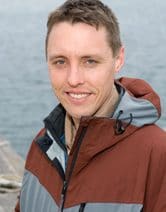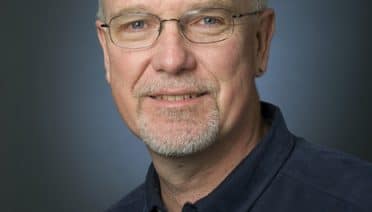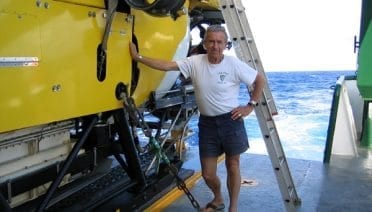Press Room
Carbon nanotubes are 10,000 times thinner than a human hair, yet stronger than steel and more durable than diamonds. They conduct heat and electricity with efficiency that rivals copper wires and silicon chips, with possible uses in everything from concrete […]
Bone-chilling temperatures, biting winds, and rapidly changing sea ice conditions make the Chukchi Sea off Point Barrow, Alaska, a particularly challenging place to work. And then there are the curious neighbors – towering polar bears that periodically stop by camp […]
The Office of Naval Research (ONR) has selected David Ralston, an assistant scientist at the Woods Hole Oceanographic Institution (WHOI), as one of the recipients of the U.S. Navy’s 2008 Young Investigator Awards.
The Per Brinck Foundation has selected biologist Hal Caswell of the Woods Hole Oceanographic Institution (WHOI), as the first recipient of the Per Brinck Oikos Award, which recognizes extraordinary and important contributions to the science of ecology.
While sampling blended biodiesel fuels purchased from small-scale retailers, researchers at the Woods Hole Oceanographic Institution found that many of the blends do not contain the advertised amount of biofuel.
A beautiful black, white and yellow butterflyfish, much admired by eco-tourists, divers and aquarium keepers alike, may be at risk of extinction, scientists have warned.
Researchers from the Woods Hole Oceanographic Institution (WHOI) and Webb Research Corporation (Falmouth, Mass.) have successfully flown the first environmentally powered robotic vehicle through the ocean. The new robotic ?glider? harvests heat energy from the ocean to propel itself across thousands of kilometers of water.
The University of Miami?s Rosenstiel School of Marine and Atmospheric Science has selected Dennis J. McGillicuddy, Jr., Ph.D., as recipient of the 2008 Rosenstiel Award. McGillicuddy, a senior scientist in the Department of Applied Ocean Physics and Engineering at WHOI is a pioneer in the study of physical-biological interactions in the ocean.
Hydrocarbons?molecules critical to life?are routinely generated by the simple interaction of seawater with the rocks under the Lost City hydrothermal vent field in the Atlantic Ocean. The production of such building blocks of life makes Lost City-like vents strong contenders as places where life might have originated on Earth, according to research led by the University of Washington and the Woods Hole Oceanographic Institution.
The U.S. National Academy of Sciences has selected Stanley Hart of the Woods Hole Oceanographic Institution as the 13th recipient of the Arthur L. Day Prize and Lectureship. Hart, a scientist emeritus in the WHOI Department of Geology and Geophysics, was recognized for making lasting contributions to the study of the physics of the Earth.
The motion, formation, and recycling of Earth?s crust?commonly known as the theory of plate tectonics?have long been thought to be continuous processes. But new research by geophysicists suggests that plate tectonic motions have occasionally stopped in Earth?s geologic history, and may do so again.
Lockheed Martin recently completed a Preliminary Design Review for the Replacement Human Occupied Vehicle (RHOV), a next generation three-person Deep Submergence Vehicle that will be used by the U.S. scientific community.
Within the month, the U.S. government must decide whether to list the polar bear as an endangered species. The question is: will such a declaration be too late because of climate change? A 2007 study by biologists, including Hal Caswell […]
A sick or injured seal or dolphin is found stranded on a beach. Should limited marine mammal protection funds be spent to rehabilitate the animal, or would they be better used to increase public education, law enforcement, or research activities? […]
Three senior scientists from the Woods Hole Oceanographic Institution will offer cautionary looks at the past and future of global climate change at the upcoming annual meeting of the American Association for the Advancement of Science (AAAS) in Boston. Lloyd […]
More than a decade after fishing stopped near the Corner Rise Seamounts in the North Atlantic, researchers have found that the seafloor still has patches that are almost completely devoid of life. During an expedition to study deep-sea corals, Woods […]
In selecting its “100 Top Science Stories of 2007,” the editors of Discover magazine recognized WHOI marine chemist Scott Doney and his colleagues for research on the effect of acid rain in coastal waters. The paper “Impact of anthropogenic atmospheric […]
In the summer of 2007, engineers from WHOI’s Deep Submergence Laboratory proved they could operate an autonomous underwater vehicle (AUV) beneath Arctic ice. Six months later, the team will now attempt to operate two AUVs simultaneously in deep ocean waters. […]
In the wake of the November 7 spill of 58,000 gallons of fuel oil into San Francisco Bay, environmental chemist Chris Reddy of the Woods Hole Oceanographic Institution (WHOI) has collected and analyzed oil samples to help assess the long-term […]
Examining more than 50,000 seafloor images, geologists have created the most detailed map ever assembled for a volcanic eruption along a fast-spreading mid-ocean ridge. Researchers from the Woods Hole Oceanographic Institution, University of Florida, and University of Hawaii mapped where […]




